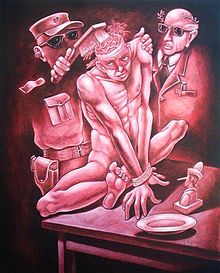Shpëlarja e trurit

Shpëlarja e trurit (e njohur edhe si kontrolli i mendjes, menticidi, bindja përmes shtrëngimit, kontrolli i mendimit, reforma e mendimit apo riedukimi i detyruar) është koncepti që mendja e njeriut mund të ndryshohet ose kontrollohet nga disa teknika psikologjike. Thuhet se larja e trurit redukton aftësinë e subjektit për të menduar në mënyrë kritike ose të pavarur, për të lejuar futjen e mendimeve dhe ideve të reja, të padëshiruara në mendjet e tyre,[1] si dhe për të ndryshuar qëndrimet, vlerat dhe besimet e tyre.[2][3]
Termi "shpëlarje truri" u përdor për herë të parë në anglisht nga Edward Hunter në vitin 1950 për të përshkruar se si qeveria kineze dukej se i detyronte njerëzit të bashkëpunonin me ta gjatë Luftës së Koresë. Hulumtimet mbi konceptin kanë shqyrtuar gjithashtu Gjermaninë naziste, disa raste kriminale në Shtetet e Bashkuara dhe veprimet e trafikantëve të qenieve njerëzore. Në fund të viteve 1960 dhe 1970, eksperimentet MKUltra të CIA-s dështuan pa asnjë përdorim operacional të subjekteve. Pasoi debati shkencor dhe ligjor, si dhe vëmendja e medias, për mundësinë e larjes së trurit si një faktor kur përdorej dietilamid i acidit lisergjik (LSD),[4] ose në shndërrimin e njerëzve në grupe që konsiderohen si kulte.[5]
Koncepti i larjes së trurit tani nuk pranohet përgjithësisht si një fakt shkencor.[6][7] Në fjalimin e rastësishëm, "shpëlarja e trurit" dhe forma e saj foljore "shpëlarje truri", përdoren në mënyrë figurative për të përshkruar përdorimin e propagandës për të bindur ose për të lëkundur opinionin publik.[8]
Shiko edhe
[Redakto | Redakto nëpërmjet kodit]Referime
[Redakto | Redakto nëpërmjet kodit]- ^ Campbell, Robert Jean (2004). Campbell's Psychiatric Dictionary. USA: Oxford University Press. fq. 403.
{{cite book}}: Mungon ose është bosh parametri|language=(Ndihmë!) - ^ Corsini, Raymond J. (2002). The Dictionary of Psychology. Psychology Press. fq. 127.
{{cite book}}: Mungon ose është bosh parametri|language=(Ndihmë!) - ^ Kowal, D.M. (2000). "Brainwashing". përmbledhur nga Love, A.E. (red.). Encyclopedia of Psychology. Vëll. 1. American Psychological Association. fq. 463–464. doi:10.1037/10516-173.
{{cite book}}: Mungon ose është bosh parametri|language=(Ndihmë!) - ^ Encyclopaedic Dictionary of Religion. Vëll. 2. Gyan Publishing House. 2005.
{{cite book}}: Mungon ose është bosh parametri|language=(Ndihmë!) - ^ Wright, Stuart (dhjetor 1997). "Media coverage of unconventional religion: Any "good news" for minority faiths?". Review of Religious Research. 39 (2): 101–115. doi:10.2307/3512176. JSTOR 3512176.
{{cite journal}}: Mungon ose është bosh parametri|language=(Ndihmë!) - ^ Usarski, Frank (6 dhjetor 2012). Cresswell, Jamie; Wilson, Bryan (red.). New Religious Movements: Challenge and Response (në anglisht). Routledge. fq. 238. ISBN 9781134636969.
... there have been until now a lack of any convincing scientific evidence which can be applied in a generalized form to show that involvement in a New Religious Movement have any destructive consequences for the psyche of the individual concerned. ... The fact that, in all the ensuing years, no one has succeeded in verifying beyond a reasonable doubt any of these claims has, however, never been regarded as a reason to exonerate the groups in any way. ... Thus, up to the time of writing, there has not been one single successful, legal conviction of the Scientology Church, even though this group has come to be regarded as the most dangerous of the new religious organizations. ... The fact that even long-term investigations have as yet failed to produce the desired results continues to be ignored.
- ^ American Psychiatric Association. DSM-5.
{{cite book}}: Mungon ose është bosh parametri|language=(Ndihmë!) - ^ "Brainwash Definition & Meaning". Merriam-Webster Dictionary. 22 korrik 2023.
{{cite web}}: Mungon ose është bosh parametri|language=(Ndihmë!)
